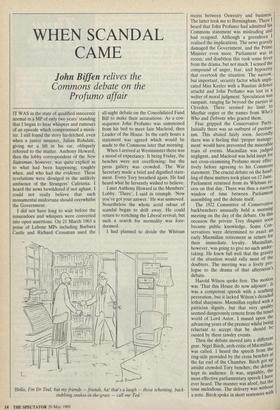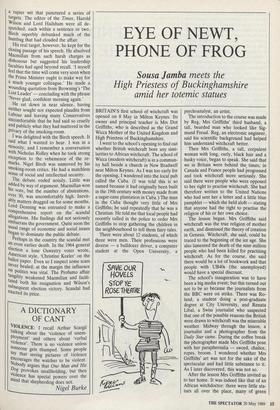WHEN SCANDAL CAME
John Biffen relives the Commons debate on the Profumo affair
IT WAS in the state of qualified innocence normal in a MP of only two years' standing that I began to hear whispers and rumours of an episode which compromised a minis- ter. I still found the story far-fetched, even when a junior minister, Julian Ridsdale, giving me a lift in his car, obliquely referred to the matter. Anthony Howard, then the lobby correspondent of the New Statesman, however, was quite explicit as to what had been happening; roughly when, and who had the evidence. These revelations were divulged in the unlikely ambience of the Strangers' Cafeteria. I heard the news bewildered if not aghast. I could not really believe that such monumental misfortune should overwhelm the Government.
I did not have long to wait before the innuendoes and whispers were converted into open assertions. On 21 March 1963 a posse of Labour MPs including Barbara Castle and Richard Crossman used the all-night debate on the Consolidated Fund Bill to make their accusations. As a con- sequence John Profumo was summoned from his bed to meet Iain Macleod, then Leader of the House. In the early hours a statement was agreed which would be made to the Commons later that morning.
When I arrived at Westminster there was a mood of expectancy. It being Friday, the benches were not overflowing; but the press gallery was crowded. The War Secretary made a brief and dignified state- ment. Every Tory breathed again. He had heard what he fervently wished to believe.
I met Anthony Howard in the Members' Lobby. 'There', I said in triumph. 'Now you've got your answer.' He was unmoved. Nonetheless the whole acrid odour of scandal began to drift away. He could return to scotching the Liberal revival; but such a search for normality was fore- doomed.
I had planned to divide the Whitsun 'Hello, I'm Dr Teal, but my friends — friends, ha! that's a laugh — those scheming, back- stabbing snakes-in-the-grass — call me Ted.'
recess between Oswestry and business, The latter took me to Birmingham. There I
heard that John Profumo had admitted his Commons statement was misleading and had resigned. Although a greenhorn I realised the implications. The news gravely damaged the Government, and the Prime Minister even more. Parliament was in recess; and doubtless this took some fever from the drama, but not much. I sensed the compound of anger, fear, and hypocrisy that overtook the situation. The narrow,
but important, security factor which impli- cated Miss Keeler with a Russian defence
attaché and John Profumo was lost in a welter of moral judgment. Speculation was rampant, ranging far beyond the parties at Cliveden. There seemed no limit to Mayfair orgies or the names from Who's Who and Debretts who graced them.
Fear gripped the Conservative Party. Initially there was an outburst of puritan-
ism. This abated fairly soon. Secondly
there was a feeling that 'proper manage- ment' would have prevented the miserable
train of events. Macmillan was judged
negligent, and Macleod was held inept for not cross-examining Profumo more effec-
tively before agreeing to his Commons statement. The crucial debate on the hand- ling of these matters took place on 17 June.
Parliament returned from its Whitsun re- cess on that day. There was thus a narrow window of time between Parliament assembling and the debate itself.
The 1922 Committee of Conservative backbenchers unusually held a morning meeting on the day of the debate. On this
occasion the private Tory disquiet soon became public knowledge. Some Con- servatives were determined to exact an early Macmillan retirement in return for their immediate loyalty. Macmillan, however, was going to give no such under-
taking. He knew full well that the gravity of the situation would rally most of the doubters. The meeting was a lively pro- logue to the drama of that afternoon's debate.
Harold Wilson spoke first. The motion was 'That this House do now adjourn'. It was a competent speech with a scathing peroration, but it lacked Wilson's dreaded lethal sharpness. Macmillan replied with a patrician dignity, but that very quality seemed dangerously remote from the tinsel world of Lord Astor. I mused upon the advancing years of the premier whilst being reluctant to accept that he should be ousted by these tawdry events.
Then the debate moved into a different gear. Nigel Birch, arch-critic of Macmillan,
was called. I heard the speech from the ring-side provided by the cross benches at the far end of the Chamber. Birch got up amidst crowded Tory benches; the debate kept its audience. It was, arguably, the most effective parliamentary speech I have ever heard. The manner was aloof, but the tone melodious. The delivery was without a note. Birch spoke in short sentences with
a rapier wit that punctured a series of targets. The editor of the Times, Harold Wilson and Lord Hailsham were all de- spatched, each within a sentence or two. Birch superbly debunked much of the humbug that had clouded the affair.
His real target, however, he kept for the closing passage of his speech. He absolved Macmillan from such harsh charges as dishonour but suggested his leadership faculties had aged beyond recall. 'I myself feel that the time will come very soon when the Prime Minister ought to make way for a much younger colleague.' He made a wounding quotation from Browning's 'The Lost Leader' — concluding with the phrase 'Never glad, confident morning again.' He sat down in near silence, having neither sought nor expected plaudits from Labour and leaving many Conservatives uncomfortable that he had said so cruelly and publicly what they had muttered in the Privacy of the smoking-room.
I was delighted with the Birch speech. It said what I wanted to hear. I was in a minority, and I remember a conversation with Nicholas Ridley when he took strong exception to the vehemence of the re- marks. Nigel Birch was unmoved by his smoking-room critics. He had a matchless sense of social and intellectual security.
The debate ended noisily. Little was added by way of argument. Macmillan won his vote, but the number of abstentions, over 30, was uncomfortably high. Inevit- ably matters dragged on for some months. Lord Denning was entrusted to make a comprehensive report on the scandal allegations. His findings did not seriously embarrass the government. Quite soon the usual range of economic and social issues began to dominate the public debate. Perhaps in the country the scandal met an even earlier death. In the 1964 general election a lone Oswestry voter wrote, American style, 'Christine Keeler' on the ballot paper. Even so I suspect some scars never healed; at the margin the influence °P politics was vital. The Profumo affair tangibly weakened Macmillan and facili- tated both his resignation and Wilson's subsequent election victory. Scandal had exacted its price.



































































 Previous page
Previous page